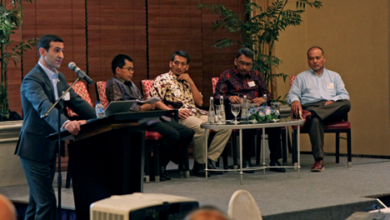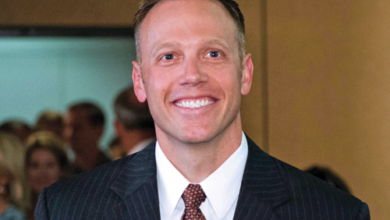Perspectives: Mark Campbell-Howes, Maersk Drilling: Drilling industry needs dedicated voice on process safety; guidelines forthcoming to drive implementation
By Alex Endress, Editorial Coordinator

When Mark Campbell-Howes, Director, Head of HSSE Development at Maersk Drilling, left his hometown of Inverness, Scotland, and moved to Aberdeen in 2006, it was one of the biggest risks he had ever taken. After graduating in 2003 from England’s Newcastle University with a degree in chemical and process engineering, he had begun a steady job with a camping equipment distributor. He left that job to start a career in the oil and gas sector even though he did not have any experience in this industry. “I looked at my friends working in oil and gas and wondered if I could get a piece of the action for myself,” he said. For a time, Mr Campbell-Howes stayed in a house with five former classmates from Scotland’s Nairn Academy, where he graduated in 1999. Six weeks after arriving in Aberdeen, Mr Campbell-Howes joined KCA Deutag as an HSE Administrator, tasked with managing the company’s incident statistics database. “I began to learn more about the way HSE incidents were categorized and reported,” he said. “I wanted to understand why things didn’t go as planned.”
He soon transitioned into roles in loss prevention engineering, which allowed him to develop an expertise in process safety, or operational risk management (ORM). It was also in these roles where he gained a global perspective on how approaches and standards on safety, including process safety, varied from region to region. “What we don’t currently have and badly need in the drilling industry, in my opinion, are guidelines on how drilling contractor companies can go about implementing things like process safety,” he said. “For a global business such as the drilling industry, a company can’t always rely on the various regulators to tell them what they need to have in their management system.”
To address this challenge, Mr Campbell-Howes is working with the IADC Operations Risk Management Advisory Group to create guidelines for managing ORM. “We need a dedicated voice on this subject of process safety,” he said, adding that the group hopes to complete the first set of guidelines by the end of 2017. “The ORM group’s goal is to illustrate what IADC membership believes is the minimum standard that organizations should uphold in order to have sound operational risk management,” he said.
In particular, Mr Campbell-Howes cited alarm management as one aspect of process safety that requires improvement. While alarms are designed to support process safety by notifying rig crews of potential hazards, the presence of too many alarms can overwhelm and confuse employees, leading to human errors that can actually increase the risk of process safety incidents. Please see an article on IADC’s upcoming alarm management guidelines on Page 28.
He recalled a project he worked on in 2012 while he was helping an oil and gas company to refine the control room alarm system for an onshore gas distribution plant. “An operator could see anywhere from 20 to 100 alarms in the course of an hour, but how does the operator know which alarms are most critical and need to be addressed first? In our project, we sought to rationalize the way in which those alarms were presented to the operator, such that they could make better-informed decisions about how to manage the process and return it to a steady state, if necessary.” For instance, in situations where multiple alarms would be activated in response to a single incident, these alarms were consolidated. In the end, the company was able to reduce the amount of alarms for its control room operators by approximately 25% per hour.
In November 2013, Mr Campbell-Howes joined Maersk Drilling as Head of Process Safety and was promoted in January this year to a newly created position of Director, Head of HSSE Development. In this role, he is tasked with ensuring better integration of Maersk’s health, safety, security and environmental teams. “We had expertise in the right areas, but we were working in silos. The challenge was to get better at collaboration and continuous improvement,” he said. One of the first steps he’s taking is to improve Maersk Drilling’s barrier management strategy. By evaluating the company’s safety-critical tasks, equipment and job roles, his team will ensure that each of those components is cooperating with one another to facilitate proper barrier management. “In a traditional mode of risk assessment, you identify hazards and look at what can go wrong. Then, you think about what you have in place to reduce that risk,” he said. “Barrier management does all that but goes one step further. It actually looks at the mitigations we have in place and asks the question: Are they doing their job?”
The new barrier management strategy, which is expected to be in place by Q1 2017, will also incorporate more concepts from human factors. “With the emergence of the cyber rig and the central control room operator, the way the industry looks at HSE has changed,” he said. While such advancements move personnel out of harm’s way, they could also bring about unintended consequences for HSE. “If you’re not on the drill floor with the wind in your face smelling the mud and listening to all the noises going on, you may not have the same situational awareness that you do when you’re in a chair operating the rig with a joystick.” He cited the use of team-based well control simulations as a tool for improving process safety. “It’s a simulation exercise where we get the entire drilling team together. Everyone is simulating the role they would have normally out on the rig,” Mr Campbell-Howes said. “It’s an invaluable experience.” DC




